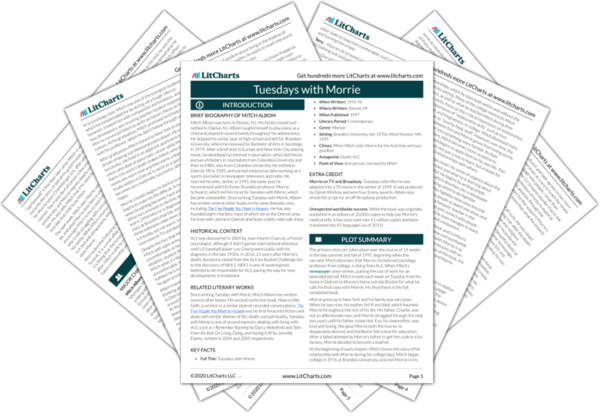Teaching and Learning
At various times throughout the book, Mitch describes the book he's written as a "long paper" or a final thesis, written for the final “class” – a class containing only Mitch – that his dying college professor, Morrie, will teach. The entirety of the text, then, is centered around the idea of teaching and learning. The book takes its structure from Morrie's "class" syllabus – each week/chapter is a lecture in Morrie’s class on…
read analysis of Teaching and LearningDeath
The events of Tuesdays with Morrie are set in motion when Mitch finds out his beloved former college professor is dying and decides to visit him. The lessons that Morrie imparts to Mitch arise from Morrie's desire to teach the world about death and how to live when one's dying, as he faces the inevitability of his own fast-approaching death. The book, then, serves as a meditation on death.
Morrie ruminates throughout the fourteen weeks…
read analysis of DeathCulture and Religion
Morrie's guiding philosophy of life is that each person must not simply accept the larger modern (mid 1990s) culture, which he consistently critiques. He takes issue with modern culture's overvaluing of materiality, achievement, and superficial things, which he believes is not conducive to living a happy, fulfilled, and successful life. He instead advocates for the creation of personal cultures, or a system of living life that allows someone to be fulfilled through careful questioning of…
read analysis of Culture and Religion
Movement and Change
Tuesdays with Morrie is very concerned with the act of moving through time and space. Movement is treated in turn as inevitable, a privilege, scary, and necessary. Morrie is dying of ALS, a disease that progressively limits its victims’ ability to move. As such, the text is constantly updating the reader as to Morrie's current ability, or lack thereof, regarding movement. The reader is asked to consider what it means to have the ability to…
read analysis of Movement and ChangeLove, Family, and Community
"Love each other or perish" is Morrie's favorite line by poet W. H. Auden, and it is the guiding philosophy of Morrie's life. He believes there is nothing as important as relationships with friends, family, and community. The text provides some nuances as to how that love is expressed by questioning if love is still valid and useful if it's harder to see. Watching Morrie's relationships evolve throughout his life asks the reader to consider…
read analysis of Love, Family, and Community






